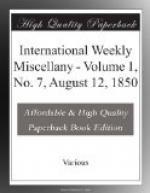prevent its circulation in France. If Jane Porter
owed her Polish inspirations so peculiarly to the
tone of the times in which she lived, she traces back,
in her introduction to the latest edition of “The
Scottish Chiefs.” her enthusiasm in the cause
of Sir William Wallace to the influence an old “Scotch
wife’s” tales and ballads produced upon
her mind while in early childhood. She wandered
amid what she describes as “beautiful green
banks,” which rose in natural terraces behind
her mothers house, and where a cow and a few sheep
occasionally fed. This house stood alone, at
the head of a little square, near the high school;
the distinguished Lord Elchies formerly lived in the
house, which was very ancient, and from those green
banks it commanded a fine view of the Firth of Forth.
While gathering “gowans” or other
wild-flowers for her infant sister, (whom she loved
more dearly than her life, during the years they lived
in most tender and affectionate companionship), she
frequently encountered this aged woman, with her knitting
in her hand; and she would speak to the eager and
intelligent child of the blessed quiet of the land,
where the cattle were browsing without fear of an
enemy; and then she would talk of the awful times of
the brave Sir William Wallace, when he fought for
Scotland, “against a cruel tyrant; like unto
them whom Abraham overcame when he recovered Lot,
with all his herds and flocks, from the proud foray
of the robber kings of the South,” who, she
never failed to add, “were all rightly punished
for oppressing the stranger in a foreign land! for
the Lord careth for the stranger.” Miss
Porter says that this woman never omitted mingling
pious allusions with her narrative. “Yet
she was a person of low degree, dressed in a coarse
woollen gown, and a plain Mutch cap, clasped
under the chin with a silver brooch, which her father
had worn at the battle of Culloden.” Of
course she filled with tales of Sir William Wallace
and the Bruce the listening ears of the lovely Saxon
child, who treasured them in her heart and brain, until
they fructified in after years into “The Scottish
Chiefs.” To these two were added “The
Pastor’s Fireside,” and a number of other
tales and romances. She contributed to several
annuals and magazines, and always took pains to keep
up the reputation she had won, achieving a large share
of the popularity, to which, as an author, she never
looked for happiness. No one could be more alive
to praise or more grateful for attention, but the
heart of a genuine, pure, loving woman, beat within
Jane Porter’s bosom, and she was never drawn
out of her domestic circle by the flattery that has
spoiled so many, men as well as women. Her mind
was admirably balanced by her home affections, which
remained unsullied and unshaken to the end of her days.
She had, in common with her three brothers and her
charming sister, the advantage of a wise and loving
mother—a woman pious without cant, and
worldly-wise without being worldly. Mrs. Porter




